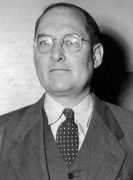Ralph Follen Fuchs
* Deceased
University Professor of Law - 1965

Ralph Fuchs was born in 1899 in Saint Louis. He earned his undergraduate and JD degrees from Washington University, a doctorate in economics from what is now the Brookings Institute, and a graduate degree in law from Yale. He practiced law privately for one year before joining the faculty at Washington University. During the Second World War, he worked for the government, first as administrative head of the Civil Service Commission’s legal division, then in the solicitor general’s office. In 1946, he became a professor of law at Indiana University, and was eventually awarded the title of university professor in honor of his scholarship, teaching, and public service.
Fuchs’ scholarly interests were wide-ranging, but much of his writing dealt with the then-emerging field of administrative law, in which he was a pioneer. Before he came to IU, Fuchs had been an important contributor in drafting one of the most important pieces of federal legislation affecting administrative law, the Administrative Procedure Act of 1946.
People who knew Ralph Fuchs at all stages of his career all mention his extraordinary personal integrity. His rather unpopular political views were deeply felt, but he never took advantage of his role in the classroom to press his views on students.
He was very active in the NAACP and was appointed to its committee on legal redress in 1949; he also served as faculty advisor to the university chapter of the NAACP. When academic freedom was threatened under the forces of McCarthyism, he worked with the American Association of University Professors, both at the campus level and as their national president from 1955 to 1957, to resist this threat and to create a culture of truly meaningful academic freedom. A member of the American Civil Liberties Union since the 1930s, he helped found the Indiana chapter and was the first chairman of the executive board of the ICLU. Throughout his career, he was unfailingly courteous and generous in the support and guidance he offered younger colleagues and students, well beyond his retirement in 1970 up until his death in 1985.

